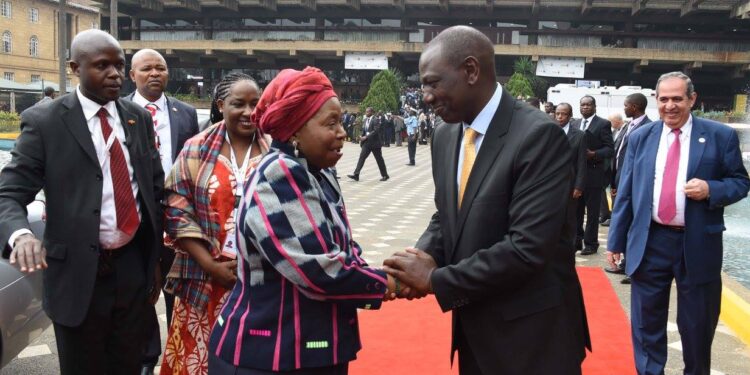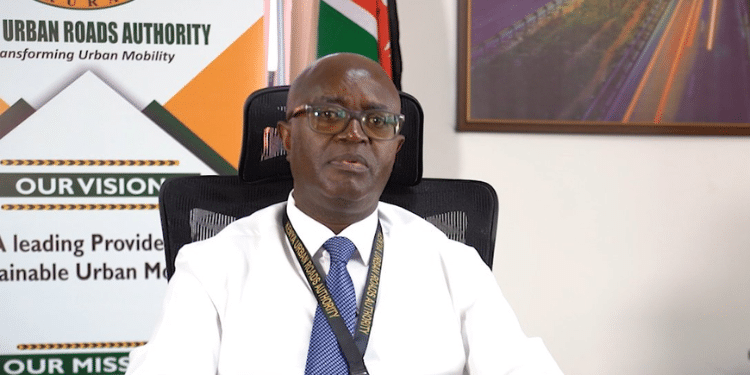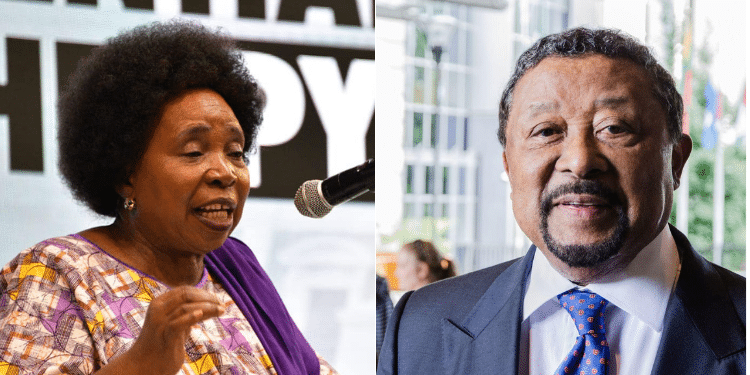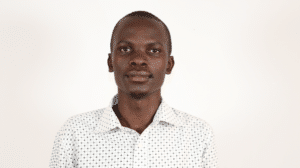The African Union Commission (AUC) is the secretariat to the AU and undertakes the day-to-day activities of the Union.
It is composed of a chairperson, deputy chairperson and eight commissioners, plus staff based in Addis Ababa, Ethiopia.
The AUC Chairperson is the Chief Executive Officer, legal representative of the AU and the Commission’s Chief Accounting Officer.
He or she is directly responsible to the Executive Council for the discharge of his or her duties.
The Chairperson of the AUC is elected by the Assembly for a four-year term, renewable once.
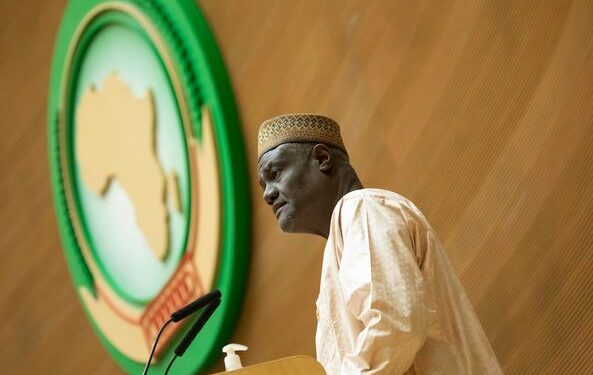
Election is by secret ballot and a two-thirds majority of Member States eligible to vote.
The current AUC Chairperson is Moussa Faki Mahamat from the Republic of Chad.
Faki was elected for the first time in 2017 and was reelected in 2022 to serve his second term.
Kenya’s former Prime Minister Raila Odinga declared his bid to succeed Faki come February 2023.
His announcement has created interest in the AUC Chairperson position especially now that he/she must come from the East African Countries.
Who did Faki succeed? Do you know all the former AUC chairpersons?
First AU Commission Chairperson
When the AU was officially launched in 2002, Amara Essy of Côte d’Ivoire took over as the acting chairperson of AUC.
Esssy served from July 2002 to September 2003 and was elected because of his vast experience in diplomatic issues.
Born on December 20, 1944, he became a diplomat and international civil servant who held numerous national and international leadership positions.
He earned a degree in public law from the University of Poitiers, France and was fluent in English, French, and Portuguese, Africa’s three most-common European languages.
Essy served as a counselor in the Côte d’Ivoire embassy in Brazil (1971–73) before becoming a counselor at Côte d’Ivoire’s mission to the UN (1973–75).
Also Read: The Hidden Gems of Kenya: Exploring the Baboon Parliament in Suswa
He was appointed ambassador to Switzerland in 1975 and also served as Côte d’Ivoire’s European representative to the UN (1975–78).
Additionally, he served as president of the Group of 77 (1977–78), an organization of nonaligned less-developed countries.
The diplomat also served as vice president of the UN General Assembly (1988–89) and as its president (1994–95).
He also served as president of the UN Security Council in January 1990.
That year, he was appointed Côte d’Ivoire’s minister of foreign affairs, a position he held until 1999.
In 2009 Essy was appointed the AU’s envoy to Madagascar, to assess that country’s political crisis.
Essy became a Member of the Global Leadership Foundation in 2014.
He joined Prosper Africa Advisory Board in 2021.
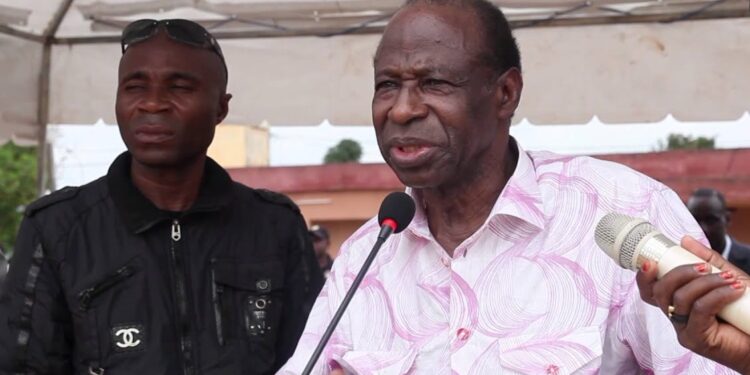
Alpha Oumar Konaré
Alpha Oumar Konaré was born in 1946 in Mali and rose to become an important figure in African politics.
He studied at the University of Bamako (1965-1969) and before moving to the University of Warsaw (Poland) between 1971 and 1975, where he earned a doctorate in History and Archaeology.
When he returned to Mali he was appointed as the minister of sports. He also lectured as a professor of history and archaeology at his alma mata, Ecole Normale Supérieure in Bamako.
In 1989, he launched the newspaper Les Échos, and in 1991 began Mali’s first free radio station, Radio Bamakan.
He was a mediator in the 1997 crisis of the Central African Republic and the Democratic Republic of the Congo (then known as Zaire).
In 1999, he was elected the annual President of ECOWAS, which obtained its first parliament in 2000 (with headquarters in Bamako).
Before assuming the role of AUC chairperson in 2003, he served as the President of Mali from 1992 to 2002, overseeing a period of democratic transition and economic growth.
He is known as a Pan-Africanist who implemented economic reform in Mali. He is credited with playing a role in protecting Mali’s archaeological, cultural, and academic histories, and curbing the spread of illegal arms in Africa.
On 25 January 2007, Konaré said that he did not intend to seek another term as chairman of the AU Commission.
After leaving the AUC, Konaré remained active in African affairs, founding several non-profit organizations focused on education, governance, and sustainable development.
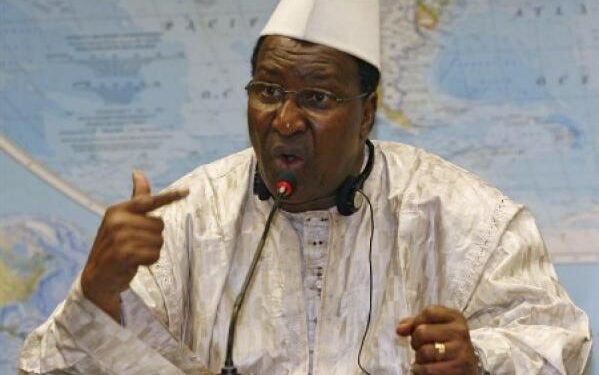
Jean Ping
Jean Ping, born in 1942 in Gabon, was a seasoned diplomat with a wealth of experience in international affairs.
Educated in France, Ping embarked on a distinguished career in diplomacy, representing Gabon on the world stage and serving in various ministerial positions.
In 1972, Ping began working as an international civil servant at UNESCO in Paris.
He served as Gabon’s Permanent Delegate to UNESCO from 1978 to 1984 before becoming involved in his country’s politics.
In 2004, Ping was chosen to be the 59th President of the United Nations General Assembly
In 2008, Ping assumed the role of AUC chairperson, bringing his diplomatic acumen and strategic vision to the position.
During his tenure, he worked tirelessly to advance the AU’s agenda on peace, security, and development.
Ping played a crucial role in mediating conflicts, facilitating negotiations, and strengthening the AU’s partnerships with regional and international actors.
After his term at the AUC, Ping continued to make significant contributions to African diplomacy.
He served as a special envoy for the United Nations, mediating conflicts and promoting peace across the continent.
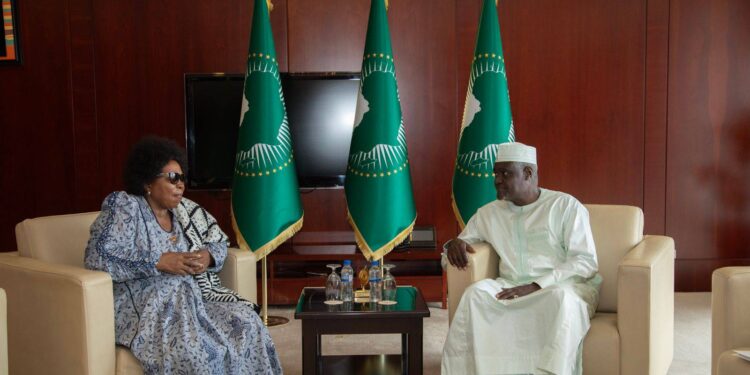
Ping’s Presidential Bid
Ping officially launched his bid for the presidency in 2015, a year before the 2016 general elections.
However, President Ali Bongo was declared the winner with 49.8% of the votes against Ping’s 48.2%, with a difference of just 5,594 votes.
He contested the results at the Constitutional Court which declared Bongo winner with 50.66% of the votes, ahead of Ping with 47.24%.
There were speculations that he was to be named the interim president in August 2023 after the army overthrew Bongo.
However, Gen. Brice Oligui Nguema, the leader of the military coup, was sworn in as the interim president.
In his new year message on January 1, 2024, Ping said the Gabonese people achieved a fundamental objective in their struggle for emancipation, namely, the end of the usurpatory, dictatorial and corrupt power of Ali Bongo.
Patriots and resistance who, for more than seven years, have led the fight against impastation are now working together with the new Gabonese authorities to rebuild Gabonese democracy as well as repair the Gabonese Republic.
He asked the citizens to join the work of rebuilding the nation and sovereignty through the restoration of justice, genuine dialogue and sincere reconciliation of all sons and daughters of our country.
“The path to the restoration of institutions undertaken by the CTRI will require the commitment and participation of all social strata of the country to usher in a genuine era of democratic alternation sought by all,” he said.
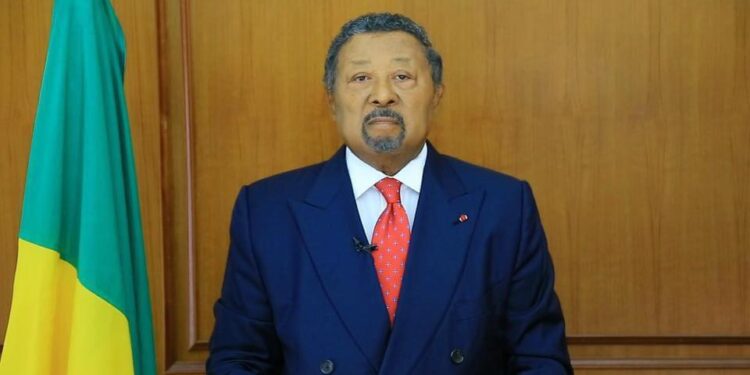
Nkosazana Dlamini-Zuma
The AU describes Dr Nkosazana Dlamini Zuma as an undisputed trailblazer in the upliftment and empowerment of women across the African continent.
Dlamini Zuma was elected chairperson of the African Union Commission by the heads of state in Addis Ababa, Ethiopia in 2012.
She is the first woman to lead the continental organization, including its predecessor, the Organization of African Unity.
A medical doctor by profession, Dlamini Zuma has been in the trenches fighting for the liberation of South Africa.
She has also championed African development and women empowerment in her illustrious career of serving people.
When South Africa achieved its independence in 1994, she served in President Nelson Mandela’s Cabinet as minister of health, a position she held until 1999.
In 1999, Dlamini Zuma was appointed minister of foreign affairs, a position she held until 2009.
She championed South Africa’s foreign policy on the promotion of human rights, multilateralism, peace and collective development, and the African renaissance.
Also Read: Where Are They Now? 4 Ex-CBK Governors and What They’re Doing
As minister of foreign Affairs, she chaired the 2001 World Conference Against Racism and was also instrumental in the launch of the African Union in Durban in 2002.
In 2009, she was appointed minister of home (interior) affairs, a position she held until 2012, when she was elected as the chairperson of the African Union Commission.
Her work in the AUC focused on a continental drive to ensure an Africa that is prosperous, integrated and peaceful.
She is the founding chairperson of the Council of the African Union Foundation, which is aimed at mobilizing resources for the African Union and promoting its programmes.
Life After chairperson position
After her AUC term, she returned to South Africa in 2017 and launched a campaign to win the presidency of the ANC but lost to incumbent President Cyril Ramaphosa.
She was sworn back in as a Member of the National Assembly, on 21 September 2017.
Dlamini-Zuma served as Minister in the Presidency with responsibility for Planning, Monitoring and Evaluation between 2018 and 2019.
In 2019, she was moved to head the Ministry of Cooperative Governance and Traditional Affairs (COGTA) a position she held up to March 2023 when she was moved to be a Minister in the Presidency responsible for Women, Youth and Persons with Disabilities.
